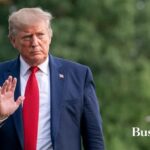On Monday, May 12, President Donald Trump announced that China has “agreed to open up” following a high-level meeting in Geneva over the weekend, where both nations decided to temporarily reduce most tariffs on each other’s goods. While offering limited details, Trump suggested this could be the most significant outcome of the talks. He noted, however, that the agreement has not been finalized and is still being formalized. Trump added that the decision is being documented ahead of an upcoming executive order on drug pricing. He emphasized that China’s agreement to open up represents a promising step toward economic cooperation.
President Trump’s remarks came just hours after U.S. and Chinese officials announced a 90-day pause on most tariffs and trade barriers, signaling a temporary de-escalation in the ongoing trade tensions. Under the deal, China will cut tariffs on American goods to 10%, a significant decrease from 125%, and the United States will cut duties on Chinese goods to 30%, a reduction of the previous 145%. Speaking Monday morning, Trump assured that tariffs would not return to 145% even if a long-term deal remains elusive after the 90-day window. However, he also hinted that tariffs could eventually rise again if progress stalls.
The newly announced agreement reduces President Trump’s reciprocal tariffs on China to 10%, marking a significant de-escalation in the trade conflict. However, the U.S. will maintain a separate 20% tariff tied to allegations regarding China’s involvement in the fentanyl crisis. Additionally, tariffs on specific Chinese imports, such as steel and aluminum, that were imposed prior to early April will remain in place. The White House claims that China has also committed to halting or removing the non-tariff countermeasures it has been using against the United States since April 2. The deal signals a cautious but notable step toward stabilizing economic ties between the two global powers. The tariffs imposed by President Trump in April effectively created a trade embargo with China, one of the United States’ largest suppliers of goods. These sweeping duties disrupted key supply chains and escalated tensions between the two economic giants. However, under the new agreement, both nations have decided to temporarily suspend most of these tariffs. This suspension is set to take effect on Wednesday, offering a short-term reprieve and a potential pathway toward a more stable and cooperative trade relationship.

Business Talk is a digital business magazine that caters to CEOs, Entrepreneurs, VC, and Corporates. While working with entrepreneurs and business executives, we focus not only on their achievements. Our mission is to shed light on business entities, including their innovations, technological benchmarks, USPs, and milestones/accolades.













